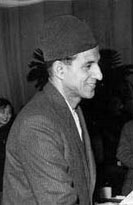Koirala in 'worldview' - Theodore Jacqueney (1982)
The former Social Democratic prime minister of Nepal, B.P. Koirala, was arrested again on November 8,1977, and charged with offences that could lead to a death sentence. I talked with him in New York shortly before he returned to Nepal.
One of the Third world's leading champions of electoral, pluralistic democracy, koirala, sixty four, was prime minister from May, 1959, to December, 1960. He was ousted at that time by the late King Mahender, who according to press accounts, was dissatisfied with Koirala's offorts to move Nepal toward constitutional monarchy and arrested the prime minister and his entire cabinet. Banning all political parties, the king jailed Koirala for eight years, much of which was spent in solitary confinement, but released him in 1968 for cancer treatment in India.
Koirala returned to Nepal in December, 1976, after an exile spent in India advocating the restoration of democratic government based on universal abult franhise and full political and human rights. He was promptly rearrested. Nepal's new king, Birendra, twenty-nine, the son of Mahendra, released him in June so that Koirala might travel to the US for operations for a throat malignancy. Having promised the king he would return, Koirala kept his word. He was reportedly arrested befor his feet again touched Nepalese soil. The Royal Air Nepal jet on which he travelled was ordered to a remote area of the Kathmandu airport and Koirala was arrested.
An official Nepalese view on Koirala, charges that the former prime minister's 1960 ouster and detention came about as a result of alleged pro-India leanings that endangered Nepal's security with respect to China and would have made impossible the peaceful resolution of a border dispute, which has since been settled. According to this official account Koirala's vigorous advocacy of democracy did not cause his arrest, since the late King Mahendra has approved of the very democratic process by which Koirala was elected. After Koirala's ouster, however, neither king Mahendra nor Birendra again permitted comparable democratic elections. The kings have since ruled through a handpicked cabinet and a 146 seat parliament selected with royal approval.
Koirala is also accused accused of organizing military raids into Nepal from India, according to the same official account. However, Amnesty International, which limits itself to Concern for non-violent 'prisoners of conscience,' has repeatedly taken up Koirala's cause during his various incarcerations. Nepalese government sources also charge that Koirala violated a signed pledge that he would not engage in political activities while abroad. Officially, Koirala's trial was interrupted so that he could come to the US for medical attention in June, and his arrest upon his return in November marks the continuation of his trial.
The Nepalese government account suggests that the human rights situation in Nepal has improved significantly, with political prisoners down for eighty to twelve. The just-published Amnesty International Report for 1971 records a continuing series of releases and new arrests, yielding a less-that-clear picture of human rights progress.
Koirala participated in India's independence movement and is an intimate of top Indian political figures such as J.P. Narayan and Chandra Shekhar, president of India's ruling Janta party, whom he consulted in India before returning to his country and who have called for his release. Indian newspapers have reported on his detention and on the efforts of Indian democrats to help free him. Indians for democracy an organization of Indians abroad who actively opposed the Indira Gandhi dictatorship, has also taken up Koirala's cause.
Before returning to his country Koirala visited a number of American and European political figures and journalists, including former West German Chancello Willy Brandt, new chairman of the Socialist International, an organization of social democratic parties to which Koirala's outlawed organization belongs as will as Austrian Chancellor Bruno Kreisky and the chief of the Socialist party of Spain, Felipe Gonzalez. The Labor party of Great Britain has issued a public resolution backing Koirala's "struggle for freedom and democracy" in Nepal and calling for his release, and the Times of London has editorialized of Koirala's behalf.
When Koirala was let out of prison to travel to the U.S. for medical attention in June, observers in Nepal and India believed his release was the probable consequence of President Jimmy Carter's championing of human rights and the triumph of the democratic forces in the recent Indian elections. Koirala himself agreed with this assessment when I spoke with him in September, 1977. Koirala's family and supporters in the U.S. say that they have been in contact with State Department and other American figures requesting public and private expressions on behalf of the release of Koirala and many of his democratic supporters in Nepal.
Under normal conditions Koirala's throat condition would have required a follow-up operation in the spring. However, eyewitness reports from people claiming to have seen Koirala in prison charge that the former prime minister is now in a state of 'medical urgency' in his detention, "coughing blood" and exhibiting other emergency symptoms similar to those that required his hospitalization last year. "Please help," requests a close Koirala associate. Who related the latest, grave account of the former prime minister's state of health. "Outside publicity goes a long way in Nepal to move the king."
(Citation: Theodore Jacqueney in Sushil Koirala (ed), Democracy Indispensable for Development 1-4 (Varanasi: Sandaju Publications, 1982)
Back
